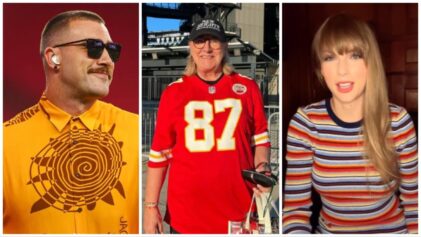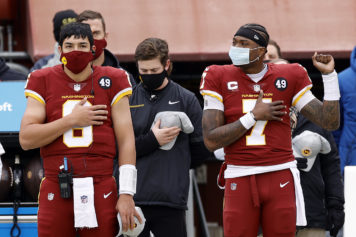Andy Reid, whose Philadelphia Eagles missed the playoffs five of his last seven seasons as head coach, was fired a week ago and hired by Kansas City four days later. Four days.
Oregon coach Chip Kelly, whose team won the Fiesta Bowl over Kansas State this weekend, was flown to two NFL teams for interviews before deciding Sunday he would stay in college. NFL coordinators, such as Josh McDaniels, who bombed in two years as head coach of the Denver Broncos, Tom Clements (Green Bay), Bruce Arians (Indianapolis), Mike McCory (Denver), Todd Haley (Pittsburgh), Mike Zimmer (Cincinnati), Jay Gruden (Bengals) and Ken Whisenhunt, who was fired by Arizona, are widely consider among the top candidates to fill the five remaining NFL head-coaching vacancies.
They all have one thing in common: They are not black.
In 2002, the NFL adopted the so-called Rooney Rule, which made it a requirement that teams with head-coach openings interview at least one minority candidate. At the time, there were just two black head coaches in the league.
Today, 11 years later, there are three.
Progress, right?
While the spirit of the Rooney Rule promotes fairness, the actual decision-making still closely resembles the closed-door policies of decades gone by.
Consider Lovie Smith. His Chicago Bears went 10-6 and he was fired. He had as much success and recent woes as Reid did in Philadelphia, but Smith still has no job offer, while Reid is putting together his staff with the Chiefs. In fact, Smith interviewed with Buffalo, but the Bills hired Syracuse’s Doug Marrone to fill its vacancy. Seriously.
Which raises a question: Is the Rooney Rule a ruse or helpful? Proponents say it is important because at least minority candidates are getting to experience interviews and face-to-face exposure to NFL executives that can only help. And that is true.
But decision-makers, who are not black, still have to make the hires, and the numbers do not bear out that a change of note has been made.
The University of Iowa, in fact, conducted a study that said the Rooney Rule has been ineffective.
John Solow, an economics professor in the UI’s Tippie College of Business, is co-author of the paper, “Moving On Up: The Rooney Rule and Minority Hiring in the NFL.” His work examined every NFL hire to head coach from 1970 to 2008. He wrote: “If the league introduced African-American coaches into the front of the pipeline instead of at the end, more of those coaches would have the experience teams are looking for and be more likely to be hired as head coaches.”
This is the same idealistic, unrealistic position that resonated around the league decades ago: hire black coaches at entry-level positions and promote them up the ranks to coordinators. Problem is, in a league where 85 per cent of the players are black, many are not getting promoted to coordinators. And those who do get there have a tough time advancing beyond that point.
Take Ray Horton, a 19-year NFL assistant who is the defensive coordinator for the Arizona Cardinals, the team that fired Whisenhunt. Horton interviewed with three teams over two recent days — Buffalo, Cleveland and the Cardinals, who should know him well enough to make a decision.
Horton is unique in this way: He wears cornrows. He told USA TODAY Sports: “I think I had three outstanding interviews. I did not give anyone a reason not to hire me.”
And yet, there are no second interviews scheduled for Horton, 52.
“The (study) results suggest that race is not an important factor in promotion decisions for head coaches,” Solow said in his paper. “However, experience, age and performance as an offensive or defensive coordinator are significant factors for NFL teams.”
Really?
Why is it, then, that college coach Chip Kelly was wined and dined by two NFL teams? His Oregon squad was beaten by Stanford, which is coached by David Shaw, who is black and whose team just won the Rose Bowl, making him 22-4 in his two years in Palo Alto. Shaw — 40, smart, talented, successful — has not been mentioned by anyone as a young coach who is NFL-ready. But Kelly is?
And consider that Shaw went through the late and legendary coach Bill Walsh’s minority coaching internship in the NFL and spent eight years as an NFL assistant, and it would seem reasonable that he would at least get an interview. You think?
“You can’t force someone to hire someone based on race,” Shaw said to the San Jose Mercury News last month. He was speaking about minority hiring in the Pac 10, but it applies to the NFL, too. “We have to train and cultivate young candidates so that they understand that, and then we have to make them accessible to the decision-makers.”
Kevin Sumlin, twice a finalist for NCAA coach of the year, is accessible. He took over at Texas A&M and is doing stellar work. First, he elevated Houston to relevance. This year, his Aggies beat Alabama, which plays for the national championship tonight; went 6-2 in the ferocious SEC; produced a system that wrought the first freshman Heisman Trophy winner in Johnny Manziel; and his team blasted perennial power Oklahoma in a BCS Bowl game.
Instead of that pedigree garnering some NFL attention, Penn State’s Bill O’Brien was flown around to interview for jobs. Guess who is the black coach of the two.
Rooney Rule or Rooney Ruse? You decide.


